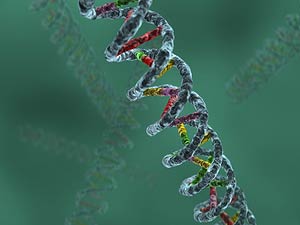|
Audio
Photos
Resources
|
 |
| Scientists are exploring how specific genes can indicate how individual patients will react to different drug therapies. (Image courtesy of SRCFat the University of Cambridge) |
Rochester, Minn. — Specific genes do specific jobs. Gene 2-D-6 creates an enzyme that helps the body digest about 70 drugs. And knowing how much of the enzyme you have is important in diagnosing which psychiatric medication to prescribe, according to Dr. David Mrazek, chair of Mayo's Psychiatry Department. He says having too little or too much of the enzyme can be a problem.
He talks about a recent case involving a teenager in the Twin Cities. Dr. Mrazek got a call from an emergency room doctor about him. The boy seemed to be having a psychotic attack, so severe he couldn't climb a flight of stairs.
"He also developed some suicidal ideation," Mrazek says. "And he wrote a suicide note and a will, giving his possession to his friends. And the psychiatric team in the cities were trying to deal with a boy they thought had a primary psychiatric illness."
The boy's parents knew he had sensitivities to certain drugs. Dr. Mrazek asked for the boy's health history and noticed that he had recently taken two doses of the cough suppressant NyQuil. Rather than experiencing a psychotic episode, the teen's genetic makeup was causing him to react badly to the drug. As the cough medicine wore off, the boy got better.
"The bottom line is that he could have been treated for a psychiatric illness based on a misdiagnosis," Mrazek says.
Mrazek came to Mayo to develop the use of pharmacogenomics in psychiatry. He says nearly every condition listed in the DSM, the official manual of mental illnesses, has a genetic link. So Mrazek says pharmacogenomics is the first step in directly treating mental illness.
Psychiatry is one of the newest areas of medicine to use the technique. It was first used to treat childhood leukemia. Dr. William Evans, the director of St. Jude Children's Research Hospital in Memphis, Tennessee, says it was a logical place to begin.
"Childhood leukemia was one of the first disseminated cancers that could be cured in over half of the patients. That was done in the late '60s. That sort of said, 'Don't give up if you have a diagnosis that involves metastatic disease.'"
Evans is one of the lead researchers in the field. He examines which medications in the cocktail of chemotherapy drugs cause a bad reaction in the child. He looks at just a few genes to determine which protein absorbs which drug. That helps him tailor a better course of medication.
It's seldom simple, though. Evans says drugs and diseases rarely, if ever affect, just one gene.
"You really have to think of this more like networks of genes," Evans says. "So the question becomes, 'So how can I make these discoveries that really involve 10, or 20, or 50 genes as opposed to one?' To date, I would say that we have discovered the low-hanging fruit, that is, the effects that are only driven by a single gene."
That could mean a lot of developments to researchers like Mrazek and Evans. Evans could figure out why white blood cells become cancer cells. And Mrazek could take the six or seven genes linked to schizophrenia and determine what environmental factors trigger the disease.
"As we come to understand how genes are related to the onset of illness, the development of problems, we'll be able to identify children at risk before they have any symptoms at all," Mrazek says. "This will be a huge opportunity to think about how to influence the development of those children so they never develop a mental illness."
Identifying those children would require developing a genetic blueprint for every child at birth. The blueprint would later be examined for a host of diseases and potential complications.
Evans sees that as a real possibility 20 years from now. He says doctors and pharmacists could then store the data and refer to it for things like blood pressure medication or diabetes care. And they both say personalizing medicine will be cheap enough to be widely used.





